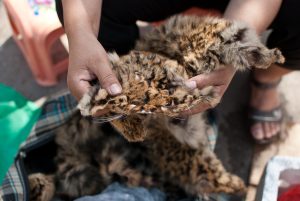The illegal online trade in endangered wildlife has boomed in Myanmar since the military coup in February 2021, the World Wildlife Fund (WWF) said in a report released today. The report offers further evidence of the extent to which Myanmar’s already significant illicit economy has swelled in the 14 chaotic months since the coup, which have been marked by a near-collapse of the formal economy and inflamed political conflict across the country.
The WWF claims that the number of illegal online transactions of endangered wildlife products rose 74 percent in 2021 to 11,046 over the previous year, according to the Associated Press. The conservation group noted that most of these transactions involved the sales of live animals, including pangolins, which are hunted for their meat and for their scales, which have supposed medicinal benefits.
Among the 173 species that changed hands in online transactions were bears, gibbons, Tibetan antelopes, and giant tortoises, as well as numerous species of monkeys that are often bought as pets. Fifty-four of the identified species are threatened with global extinction.
The AP quoted Shaun Martin, the head of the WWF’s Asia-Pacific regional cybercrime project, as saying that different species are often kept in close proximity, creating the conditions for the emergence of zoonotic diseases like COVID-19. “With Asia’s track record as a breeding ground for many recent zoonotic diseases, this sharp uptick in online trade of wildlife in Myanmar is extremely concerning,” he told the news agency.
The trade in endangered wildlife, both live animals and animal parts, has long flourished in the borderlands of Myanmar, Thailand, and China. It has grown steadily in line with increased economic integration within the region and with an increasingly wealthy China, which by virtue of its size has amplified the regional demand for exotic animal products.
But growing internet connectivity have led to a significant shift in how these types of transactions take place. In June 2021, the advocacy group TRAFFIC reported that it had observed “a clear shift from physical marketplaces to e-commerce websites and social media platforms.” It said that social media platforms were now “the preferred medium for wildlife traffickers to connect with buyers in many regions around the world.”
The WWF report found that most of the transactions in Myanmar took place via Facebook, which has come under scrutiny for its lax efforts to remove hate speech that fanned the flames of inter-communal violence in Myanmar, particularly against the Muslim Rohingya. The group identified 639 Facebook accounts belonging to wildlife traders, in addition to a trading group that had more than 19,000 members. The fact that so many wildlife transactions take place in the open on Facebook groups suggests that such dealings remain “largely risk-free,” the report said.
While WWF notes that Facebook has been cooperative in cracking down on the use of its platform as a wildlife marketplace – the social media giant is a member of the Coalition to End Wildlife Trafficking Online – crackdowns are complicated by the difficulty in keeping track with the sale of wildlife products online. Very often the process involves a game of whack-a-mole in which new accounts and pages appear to replace those that are taken down.
The findings of the report are in many ways no surprise. Since the coup, the formal economy has atrophied, contracting by nearly a fifth in 2021, and the weakening hold of the central state has led Myanmar’s illicit economy to surge to the fore. Moreover, as the Myanmar military comes under increasing economic sanction from the West, it will come to rely more heavily on these subterranean flows of cash.
In areas of eastern Shan State that lie under the de facto control of armed rebel groups and small “subcontractor” militias vested with local authority by the Myanmar military, the increasing political chaos has been an opportunity to scale up drug operations. “Meth production increased last year from already extreme levels in northern Myanmar and there is no sign it will slow down,” Jeremy Douglas, the UNODC’s regional representative in Southeast Asia, told the Reuters news agency in early February.
As long as Myanmar remains mired in its current welter of localized and nationwide civil conflicts, there is every chance that these illicit trades will continue to grow.

































